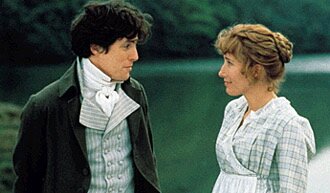|
|
| Tookey's Review |
|
| Pro Reviews |
|
| Mixed Reviews |
|
| Anti Reviews |
|
| Cast |
|
| |
 |
| |
| Released: |
1996 |
| |
|
| Genre: |
DRAMA
ROMANCE
|
| |
|
| Origin: |
US |
| |
|
| Length: |
135 |
|
| |
|
| |
|
|
| |
|
|
It's about two sisters.
|
Reviewed by Chris Tookey
|
Elinor (played by the film's screenwriter, Emma Thompson, pictured right) is "Sense", pragmatic, conventional and emotionally repressed, while her younger sister Marianne (touchingly played by Kate Winslet) is "Sensibility", recklessly romantic and outspoken. They are at the poor end of aristocratic society, and confined to a dilapidated house in Devon, cheated of their inheritance by their older step-brother (James Fleet, wonderfully weak) and his mercenary wife (Harriet Walter, delightfully devious).
The sisters proceed to encounter more than their fair share of romantic problems. Elinor falls for an amiable, tongue-tied young chap (Hugh Grant, pictured left) who seems at first to reciprocate but then abruptly leaves for London, never to be seen again - or so it seems.
Marianne, meanwhile, is being courted by neighbouring landowner Colonel Brandon (Alan Rickman, in a marvellously nuanced, brooding performance), who is as stiff as he is honourable. Marianne can't see beyond a younger man, Willoughby (Greg Wise, too handsome for his own good, and much too good to be true). Willoughby sweeps her off her feet, first literally and then metaphorically, before also leaving for London under mysterious circumstances.
When I first saw this, I was expecting just another worthy, picturesque and probably slow rendition of a classic novel. Inside, I found myself enjoying the paciest, wittiest, most entertaining romantic comedy since Four Weddings and a Funeral - faithful in spirit to Jane Austen's novel, but not in the least literary, cobwebby or outmoded: a sublimely funny film, which also moved me to tears on at least three occasions. The events which unfold are proof that Jane Austen could spin a rattling yarn, and Emma Thompson's screenplay actually enhances the original. making the men more interesting and pointing up the underlying darkness of the story - which hinges on greed and betrayal - without ever losing sight of its fun, high spirits and romance.
It has been objected that, at 36, Thompson is almost twice the age of Elinor (Austen mentions that she is 19), but oddly enough this helps a modern audience, which might well find it incredible that in Regency England a girl of nineteen could be considered "on the shelf".
Besides, it is impossible to imagine that any younger actress would be able to equal Thompson here. She is simply miraculous, moral but not priggish, extracting every bit of merriment and pathos from the role, while apparently playing second fiddle in almost every scene.
The moment when she learns of her own happy ending, and almost expires with great sobs of joy and long-suppressed anguish, is one I shall always remember. I doubt whether anyone watching it will be able to restrain the tears.
Hugh Grant is equally charming, and even more blissfully funny. With his air of incipient apology and head sinking ever deeper between hunched shoulders, like a tortoise in anticipation of a crushing tax demand, he suggests a man both emotionally retarded yet possessed of an underlying maturity which might easily be underestimated. It's an extraordinarily skilful, playful performance in a challenging role, and a welcome return to the form which deservedly made him a star in Four Weddings.
The rest of the supporting cast is better than faultless, with three admirable couples as light relief: Harriet Walter and James Fleet, Elizabeth Spriggs and Robert Hardy, and Hugh Laurie and Imelda Staunton. Perhaps Imogen Stubbs might have made a little more of Elinor's vixenish rival in love, and the script might have made her mercenary calculations clearer, but that’s my only quibble, and a very minor one.
The young Taiwanese director Ang Lee had already made two highly enjoyable films in The Wedding Banquet and Eat Drink Man Woman. This is even better, and his subtlety is ideally suited to this very English story. Whereas Martin Scorsese might have shown off with over-elaborate camera moves or James Ivory might have dwelt too long on the background detail, Lee is rightly content to trust the screenplay, find the perfect framing and let his wonderful cast act within it.
Although Lee shows himself to be a profound, humane film-maker with exquisite taste and discretion, he is helped enormously by top-class creative support from Brits Michael Coulter (cinematographer on Local Hero and Four Weddings), Luciana Arrighi (production designer on Howards End) and Jenny Beavan and John Bright (costume designers on A Room With a View and The Remains of the Day). Patrick Doyle's music is as excellent here as it was on A Little Princess.
Sense and Sensibility combines some of our best home-grown cinematic talent with the unashamed emotionalism of a big, Hollywood movie. It will come as a splendid surprise to anyone who thought that any adaptation of a classic novel has to be dry, talky or outdated. It is quite the best ever transference of Jane Austen to the small or large screen, and as fresh and entertaining as if it had been written yesterday.
Its central arguments - that love should conquer avarice, and duty and loyalty are beyond price - are timeless truths, expressed here with elegance, eloquence and refreshing intelligence. If you have any sense, you'll see it.
"Can everyone in England act?"
|
(Ang Lee at actors' auditions)
|
|
|
